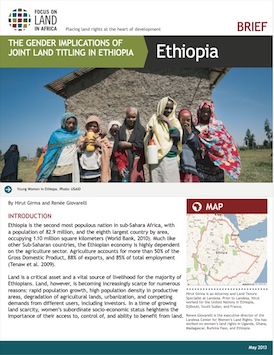This book presents the findings of a nine-month action research process in Karamoja. Over the months, the broad topics of the research – land, peace and customary law – were refined to three precise areas of focus on how decisions are made: herder-cultivator disputes and Karimojong governance;…
Land is a critical asset and a vital source of livelihood for the majority of Ethiopians. Land, however, is becoming increasingly scarce for numerous reasons: rapid population growth, high population density in productive areas, degradation of agricultural lands, urbanization, and competing…
This paper is about land tenure relations among the matrilineal and patrilineal cultures in Malawi. Data from the National Agricultural and Livestock Census are used to characterize marriage systems and settlement and landholding patterns for local communities. Marriage systems correspond to…
Large-scale land investment is not a new phenomenon in Africa, but the speed and scale at which it is occurring today makes it one of the most pressing issues on the continent. These land investments are promoted by advocates as “win-win” solutions - benefiting national economies, rural…
China’s impressive inroads into Africa’s resources sectors over the past decade are explained largely by the timely match between a cash-loaded China in search of raw materials and a continent with a vast pool of underdeveloped mineral deposits, exploration of which has been hindered for decades…
CAADP Policy Brief 10by Kate Wellard-Dyer
Large-scale foreign land acquisitions - land grabs - are major and real concerns for African populations. The consequences of land deals are highly significant for local populations and the environment. Some see economic opportunities for local…
Land degradation is a serious problem in Sub-Saharan Africa, where up to two-thirds of the productive land area is reported to be degraded to some extent. Local communities suffer the most from the degradation of their land and they are therefore fundamental to the widespread adoption of…
Angola, like Mozambique, inherited its legal framework from the Portuguese Civil Code, which was not based on a traditional African concept of community occupation under customary law. With Portuguese settlement, large areas of land were appropriated for and incorporated into the colonial…
Based on worldwide experience and encouraging evidence from country pilots in African countries such as Ghana, Malawi, Mozambique, Tanzania,and Uganda, this new report suggests a series of ten steps that may help to revolutionise agricultural production and eradicate poverty in Africa. These…
Future Agricultures Working Paper 73Emmanuel Sulle and Fred NelsonDecember 2013
Like much of sub-Saharan Africa, Tanzania has experienced a surge in land-based investment during the past decade. While expanding private investment in agriculture is a core ambition of the G8’s New Alliance…
Payments for ecosystem services (PES) provide a market based instrument to motivate changes in land use that degrade ecosystem services. This investigation sought to better understand how effective PES schemes are in meeting the goals of safeguarding ecosystem services, while also …
Walter ChambatiApril 2013
This paper begins highlights some key features that shape agrarian labour relations in Zimbabwe, illustrated through the setting of Goromonzi district. The new agrarian structure that forms the basis of the reconfigured agricultural production systems and labour…


